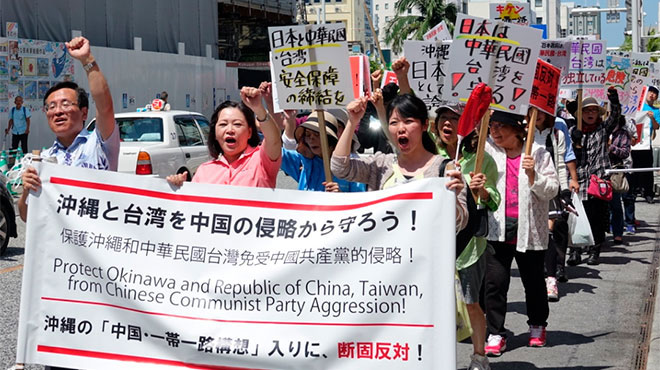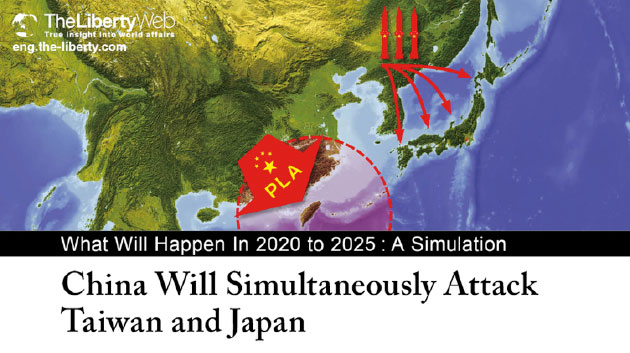The U.S. Defending Taiwan
A Simulation For Years 2020 to 2025
The U.S. revised their long-time China policy, and now Japan cannot continue with their current diplomacy, says specialist, Kazuo Asano.

Kazuo Asano
Professor at Heisei International University
Born in 1959, in Tokyo, Asano obtained a doctorate in Law from Keio University. He currently holds a teaching position at Heisei International University and is the Senior Director at the Friends of Lee Teng Hui Association in Japan. He has numerous publications in Japanese.
With the impending danger of China’s unification project, it may look like Taiwan has no future. But the Trump administration broke boundaries when they reversed their 40-year-long China policy. They have shifted to place more importance on Taiwan and are now embarking on a landmark diplomatic strategy.
In 1979, the U.S. naturalized relations with China and cut all ties with Taiwan. They compensated for it by enacting the Taiwan Relations Act allowing them to support Taiwan by selling them arms.
This policy was implemented to balance both China and Taiwan’s interests. The U.S. was convinced that China would eventually democratize, negotiate with Taiwan, and achieve a peaceful unification. In other words, the U.S. made this diplomatic decision in the hopes that China would head towards democratization.
But last January, Chairman Xi Jinping declared his intention to “unify Taiwan with the One Country Two Systems policy,” and hinted that he will use military force if Taiwan pushes for independence. He also rejected Tsai Ing-wen’s ‘maintaining the status quo’ idea.
Last October, Vice President Mike Pence admitted that China’s economic growth did not lead to democratization, and they will revise their China policy based on the knowledge that the democratization plan failed.
Now they are moving to Taiwan’s defense by revising their pro-China policy implemented in 1979, boosting their weapons sales to Taiwan, and recognising Taiwan as a country in their Department of Defense report.
Japan to Make Formal Declaration of Taiwan Support
Ever since Japan normalized relations with China, they have been over-considerate towards China and largely ignoring Taiwan. There is the domestically famous case of Minister of Foreign Affairs Yohei Kono’s unintended visit to Taiwan.
When Kono was on his way to the ASEAN PMC in Thailand, strong winds forced his plane to make an emergency landing in Taiwan. Upon landing, however, Kono was so scared of being criticised by China that he refused to get off the plane and set foot on Taiwan soil. Not only that, he boasted of this fact to China’s then Foreign Minister Qian Qichen to gain brownie points.
While PM Shinzo Abe is not that clingy with China, he still welcomes Xi with highest honours when in Japan. Japan is still afraid of provoking China.
But when the U.S. changed their China policy, we entered an age where Japan must choose who to side with: the U.S. or China.
Enacting the Japan-Taiwan Fundamental Exchange Act
Japan can declare support for Taiwan by enacting the Japanese equivalent of the Taiwan Relations Act called the Japan-Taiwan Fundamental Exchange Act.
Japan and Taiwan are engaged in abundant economic and cultural exchanges, but none of it is backed by law. The Japanese government is limiting Japan-Taiwan relations to exchanges only in the private sector. But legislated and official defense talks are necessary to counter China’s military expansion and advancement into the Pacific.
The other way is to strengthen economic relations. Japan must sign a free trade agreement with Taiwan to support their economy. Joining hands with Taiwan would allow Japan access to resources such as Chinese-speaking people and Chinese-language networks around the globe.
Taiwanese tourists are number 3 on Japan’s list of the greatest number of tourists. Taiwan will become an important partner in Japan’s regional development.
Japan and Taiwan must strengthen relations and champion the common values of freedom and democracy.
Japan Hasn’t Realized Trump’s New Taiwan Policy
1979-2017 (The U.S. cuts ties with Taiwan)
[China] Normalized Relations (expectations of democratization) [U.S.] Cut Ties (Taiwan Relations Act) [Taiwan]
[China] Normalized Relations (Considerations) [Japan] Cut Ties (Largely Ignores) [Taiwan]
2018-onwards (The U.S. turns to defend Taiwan) (Japan doesn’t realize U.S. changes to Taiwan policy)
[China] Conflicts [U.S.] Defends [Taiwan]
[China] Remains Unchanged [Japan] Remains Unchanged [Taiwan]
PM Abe’s Awareness of China Is Outdated
“China’s peaceful rise is a great opportunity for Japan and the world” (PM Abe in 2016)
“Japan-Taiwan relations are on their way to complete normalization” (PM Abe in 2019)
Conclusion
Japan and Taiwan Share a Common Destiny
Japan and Taiwan are not just friends; they are companions with their survival at risk.
Okinawans Protest to Protect Taiwan’s Freedom

Photo: The protest that HRP Okinawa headquarters organized.
China is trying to engulf Taiwan. If China invades Taiwan, there is a high chance that they will make a simultaneous attack on Japan. Japan and Taiwan face a common threat.
But a survey of Japan’s politics reveals their unashamed disinterest in the Taiwan problem. During his visit to Okinawa in April, Governor of Okinawa, Denny Tamaki even said, “We want China to use Okinawa as a gateway to the belt and Road Initiative in Japan.” They have not grasped a sense of the impending crisis.
Only the Happiness Realization Party (HRP) is pushing for Taiwan’s defence. In June, the HRP Okinawa Headquarters responded to Tamaki’s statement by organizing a protest demanding the country to protect the freedom of Okinawa, Taiwan and Hong Kong. A total of 410 people of all ages joined the rally, some with their whole families.
The participants cried out, “Protect Okinawa and Taiwan from China’s invasion,” “We say no to Okinawa joining the Belt and Road,” as they marched along the streets of Naha city. A group of Taiwanese tourists watching shouted back, “Arigato!” (“Thank you!”)
What Japan must do, is develop the awareness that they share a common destiny with Taiwan. They must stop their appeasement China policy and resist the communist superpower instead. More specifically, Japan must strengthen national defense, and create economic and security ties with Taiwan.
Japan must become the Leader of the East and protect Asia’s freedom, democracy and faith rom China’s advances.



















